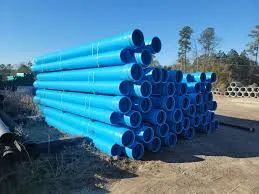
When it comes to choosing the right piping for your home or business, PVC pipes are a great option. But before you decide to use them, there are some things you need to know. This blog contains some of the major details that you need to know about PVC pipes. We will also help you understand the differences between PVC, CPVC and UPVC pipes. Read on.
What Are PVC Pipes Made Of?

PVC pipes are made of polyvinyl chloride, a plastic that is made by combining chlorine and ethylene. The finished product is a white or light-colored plastic that is rigid and durable. PVC pipes are used for a variety of purposes, including water and wastewater conveyance, electrical wiring, and plumbing.
One of the benefits of PVC pipe is that it does not corrode in contact with many common substances found in the environment, such as acids, bases, oils, and salts. This makes PVC an ideal material for use in underground systems where it may be exposed to these elements. Additionally, PVC is non-toxic and does not release harmful fumes when burned.
Uses Of PVC Pipes
PVC pipes have a variety of uses in both residential and commercial settings. Some of the most common uses include water transportation, waste management, and electrical wiring.
- Water Transportation: PVC pipes are often used to transport water in both residential and commercial settings. They are durable and can withstand high pressure, making them ideal for this purpose.
- Waste Management: PVC pipes are also commonly used for waste management. They are resistant to corrosion and pests, making them an ideal material for transporting waste. Additionally, they are easy to clean and maintain, which is important for keeping environments sanitary.
- Electrical Wiring: PVC piping can also be used as electrical wiring. It is a non-conductive material, so it is ideal for this purpose. It is also flame retardant and UV resistant, making it a safe choice for electrical wiring.
- Irrigation: Irrigation with PVC pipes is a common practice on many farms and ranches. PVC pipes are durable, flexible, and easy to install, making them the perfect choice for irrigation. Farmers and ranchers use irrigation systems to distribute water evenly across their fields or pastures. This helps to improve the health of the crops or livestock and also saves money by using the water more efficiently.
1/2’ PVC electric protective pipe
What Are The Benefits Of PVC Pipes?
When it comes to choosing the right piping for a project, there are many factors to consider. But, what are the benefits of PVC pipes?
PVC pipes have a long lifespan and are durable enough to withstand pressure and weather conditions. They’re also non-toxic and resist corrosion, making them a safe choice for both indoor and outdoor applications. Additionally, PVC is easy to install and can be joined together using solvent welding or adhesive fittings.
PVC pipes have several benefits:
- They are lightweight and easy to install. This makes them a good choice for projects where weight is a concern, such as in high-rise buildings or when installing plumbing in an existing structure.
- PVC pipes are resistant to corrosion and weather conditions, making them a good choice for outdoor projects.
- They are non-toxic, making them safe for use in both indoor and outdoor applications.
- They can be joined together using solvent welding or adhesive fittings, making them easy to install.
- PVC pipes have a long lifespan and are durable enough to withstand pressure and weather conditions. So, if you’re looking for a piping material that will last, PVC is a good option.
Differences Between PVC, CPVC, And UPVC Pipes

When it comes to piping materials, there are three primary options: PVC, CPVC, and UPVC. Each has its own benefits and drawbacks, which we will explore in this post.
PVC pipe is made from polyvinyl chloride, a rigid plastic. It’s the most common type of pipe used in residential plumbing systems and is relatively affordable compared to other materials. However, it can be brittle and prone to cracking, so it’s not always suitable for use in high-stress applications.
CPVC pipe is made from chlorinated polyvinyl chloride, a plastic that’s more durable than PVC. It’s less likely to crack or corrode, making it ideal for use in environments with high water pressure. However, CPVC is more expensive than PVC and can be difficult to work with.
UPVC pipe is made from unplasticized polyvinyl chloride, a type of plastic that’s more durable than both PVC and CPVC. UPVC pipes are less likely to corrode or develop leaks, making them a good choice for water-sensitive applications. However, they’re also the most expensive option of the three materials.
So what’s the best piping material for your needs? It depends on your application and budget. If you need a material that’s resistant to cracking and corrosion, go with CPVC. If you’re looking for a more durable option, UPVC is a good choice. PVC is good for applications where affordability is a priority.
Conclusion
PVC pipes are one of the most largely produced pipes in the world with about 40 millions tons being manufactured on a yearly basis. This simply goes to show you that it is a preferred pipe for many people and is used for both commercial and residential purposes. However, you have to be on the look out when it comes to the supplier you choose to work with.


